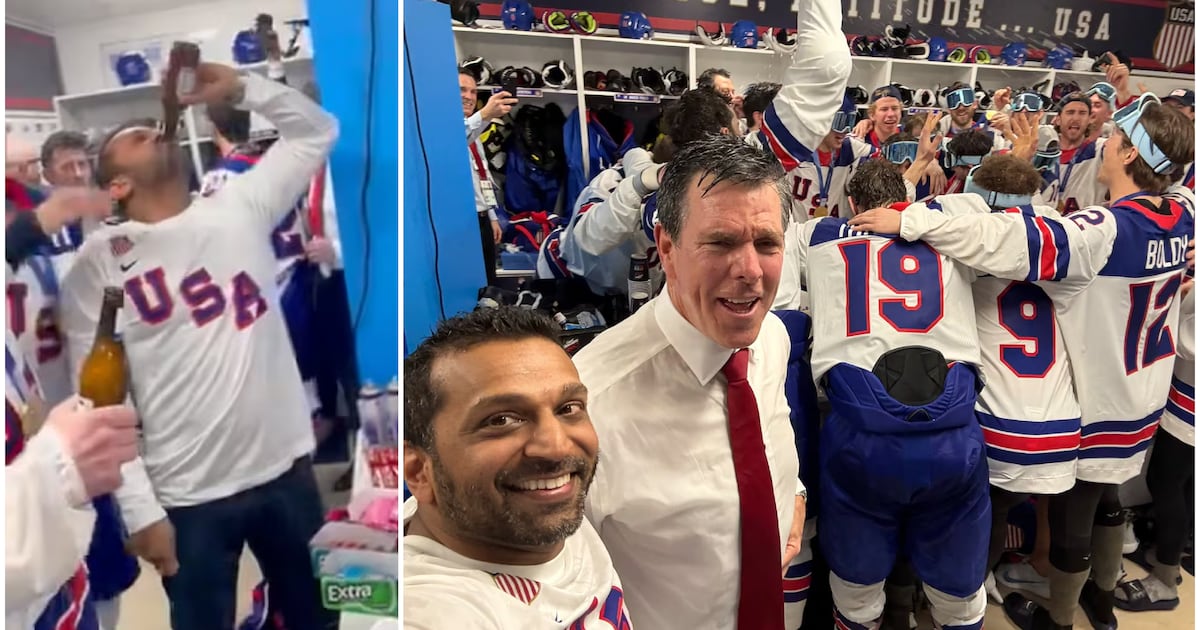Howard “Ford” Sypher specializes in chaos. A former member of the elite Army Rangers, he served three tours in Iraq and two in Afghanistan. Now a civilian, he and a team of war veterans chase disasters—tornadoes in Tuscaloosa, hurricanes in New York—to help people in the aftermath. He is used to the unexpected.

And so he was ready for action this week in Washington, D.C., when he came upon a sudden crisis on a busy city street. A car had swerved out of control, plowing into two other cars, then smacking into several people on the sidewalk. One woman was hit so hard, he says, “it blew her shoes and socks off.”
Sypher was in town for Newsweek and The Daily Beast’s inaugural Hero Summit, honoring military leaders and other people of courage. He had spoken at the summit about how veterans are coming together by the thousands through his nonprofit group, Team Rubicon, to serve as volunteers in disaster zones.
He didn’t expect to find himself in the middle of a disaster on the streets of the capital city. But when it happened, he knew what to do.
In a taxi on Friday when the accident occurred, he jumped out and ran to the people lying sprawled on the sidewalk. “I thought I was gonna find people in pieces,” he says. “I expected to find hamburger all over the place. Luckily, no one was dead.”
Sypher, who had trained as an emergency medical technician in the military, performed an immediate triage on the two people who’d been struck, checking them for injuries and broken bones; then he calmed the shocked group of bystanders. The paramedics came and whisked the victims away; it was unclear why the driver had lost control.
At the scene, he says, a homeless veteran walked up and offered to help. Sypher handed him his card.
"It just happens like that,” he says.
Sypher went back to his hotel, washed off the blood, and ate a slice of apple pie. That night, he boarded a train for New York, to resume his work in the Rockaways, the Queens neighborhood decimated by Hurricane Sandy. He has been working there for weeks, living in a van. Before the summit, he says, “I hadn’t showered or shaved in a week and a half.”

Sypher, a 26-year-old Kansas native, has a wild life story, beginning with a teenage adventure in South America. After high school, he moved to the jungles of Peru, working and studying with a professor he knew from the University of Kansas. His parents were both academics, and he had “grown up on college campuses,” he says. In Peru, he saw an opportunity to learn about indigenous tribes—and much more.
“I saw it all—tribal warfare, violence, illegal mining, illegal lumber training, human trafficking,” he says. “I gained a passion for human rights, indigenous rights, conflict resolution.”
The jungles, he says, were “completely devoid of white Western influences.” He remembers asking the tribesmen if they knew about how the Twin Towers had been hit by terrorists. The men produced an old calendar with a dusty image of the World Trade Center, probably given to them by a missionary. The towers didn’t seem real to them, he says; the image was from another world. “Their perception of life and history is all very fluid,” he said. “It was too difficult for them to understand.”
He moved back to the States to study anthropology and global studies at the University of Kansas, but quickly found that he didn’t fit in. Students were speaking academically about human rights and conflict, with no real-life experience, he says. When he tried to talk about his life with the tribes of Peru, he says, “It was like teaching a young child about sex by forcing him to watch porn.” He adds, “I didn’t hold it against them, by any means. But I knew I was different. I needed to be on the ground.”
In 2006, when he was around 20 years old, he withdrew from the university and enlisted in the Army. “Every generation of my family has served in some capacity—through teaching, public service, the military,” he says. In the Army, he began to understand his own country, he says: “I met people from all over the country. It was great. These people become your family. You support one another. It’s emotional to even talk about it.”
He joined the Rangers, the elite special-operations unit of the Army. “We like to compete with the Navy SEALs,” he says. “They can play in the water. We’re better on the land.” He jokes that the SEALs are more well-known because “they have a better propaganda machine. We don’t talk about it.”
After five years in the Army, with multiple deployments in Iraq and Afghanistan, Sypher needed a change. For one thing, he had fallen in love, and was planning to get married. “We had been dating for two years,” he says. “She was a nurse. It was a classic love story.”
However, when he returned home, life became less clear. He remembers sitting at the sprawling Bonnaroo music festival in Tennessee with his girlfriend and thousands of revelers, thinking, “A week ago I was getting shot at in Afghanistan.” That day, his father had a massive heart attack.
He went home to spend time with his dad, and found himself questioning his future, his plans for marriage, everything. In the military, he says, “I’d been so focused—I had purpose, drive, mission.” He began to think about possibly reenlisting. He told his girlfriend that he needed some time to clear his mind, a concept she didn’t fully understand.
He “packed a bag and went to South America,” he says, working on a documentary film with a friend in Venezuela. His relationship with his girlfriend back home dissolved. Weeks of soul-searching followed. And then, he connected with one of his father’s former students, a man who was starting an aid group with a unique goal, enlisting vets to serve as volunteers—Team Rubicon.
Sypher liked the sound of that. In the spring of 2011, he went with the group to tornado-ravaged Alabama. He remembers seeing the guys on that trip “getting their gear ready for the mission,” just like in the war zones. They were preparing to clear debris, to bring people to safety, using the skills they’d learned in the military. Suddenly he had found his place.
Since then, Sypher, now director of field operations, has been across the country, and to the other side of the world in the refugee camps of South Sudan. “There’s a dual-service angle,” he says of his work, as he prepares for a day in the Rockaways, where Rubicon has galvanized some 5,000 volunteer veterans. “We’re providing service to those most in need—while helping save ourselves.”






